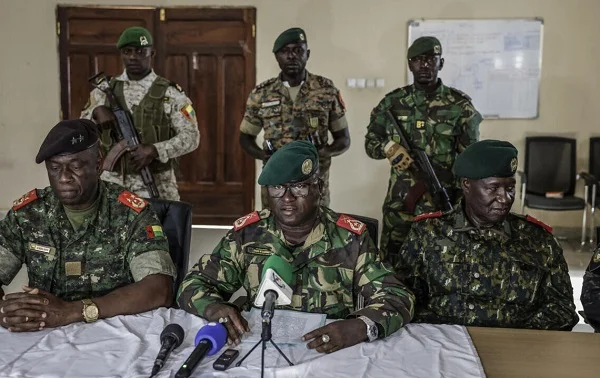Soldiers have seized control in Guinea-Bissau. They appeared on state television on Wednesday to declare a takeover. The military announced it has assumed full powers over the government.
In a broadcast statement, the “Military High Command” justified the action. They claimed there was a plot to manipulate recent election results. Consequently, they intervened to stop the alleged destabilization.
“Restoration of Order”
Military spokesperson Dinis N’Tchama announced a new governing body. It is titled the “High Military Command for the Restoration of Order.”
He outlined immediate and sweeping directives. The military suspended all state institutions until further notice.
“We suspend the activities of all media outlets,” N’Tchama declared. He also ordered the immediate closure of land, sea, and air borders. Furthermore, the current electoral process has been halted.
A Capital Under Lockdown
Gunfire erupted earlier in the capital, Bissau. Shots were heard near the presidential palace. Heavily armed soldiers now man checkpoints across the city.
Journalists reported that troops have closed roads leading to the presidency. Additionally, the military has cracked down on electoral officials.
Reports indicate the arrest of the election commission chief. Troops have sealed off the commission’s headquarters. This occurred just a day before the body was scheduled to release provisional results.
President Embaló Detained
Outgoing President Umaro Sissoco Embaló is reportedly in custody. He stated that the army chief of staff led the coup. However, he confirmed that he was not subjected to violence.
The President faced a deepening legitimacy crisis. Opposition groups argued his tenure had expired. They refused to recognize his authority leading up to the vote.
A Disputed Election
The coup follows a chaotic 24 hours. Both leading candidates claimed victory in last week’s election.
President Embaló and challenger Fernando Dias da Costa both declared themselves winners prematurely. These competing claims raised political temperatures significantly.
This event marks another turbulent chapter for the nation. Since independence in 1974, Guinea-Bissau has suffered a string of coups and attempted military takeovers.




















